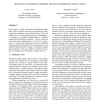Free Online Productivity Tools
i2Speak
i2Symbol
i2OCR
iTex2Img
iWeb2Print
iWeb2Shot
i2Type
iPdf2Split
iPdf2Merge
i2Bopomofo
i2Arabic
i2Style
i2Image
i2PDF
iLatex2Rtf
Sci2ools
WSC
2007
2007
Simulation of scheduled ordering policies in distribution supply chains
In this paper we study a decentralized distribution supply chain with one supplier and many newsvendor-type retailers that face exogenous end-customer demands. Using total supply chain cost as our primary measure of performance, we compare two scheduled ordering policies – Balanced ordering and Synchronized ordering – with the traditional newsvendor-type ordering behavior. Via the use of simulation, we evaluate the effectiveness of the two scheduled ordering policies, and identify how the performance of the scheduled ordering policies changes with different supply chain parameters, such as the number of retailers, the supplier’s expediting cost, the supplier’s capacity limit, etc.
Modeling And Simulation | Scheduled Ordering Policies | Supply Chain | Supply Chain Cost | WSC 2007 |
Related Content
| Added | 02 Oct 2010 |
| Updated | 02 Oct 2010 |
| Type | Conference |
| Year | 2007 |
| Where | WSC |
| Authors | Lucy G. Chen, Srinagesh Gavirneni |
Comments (0)

